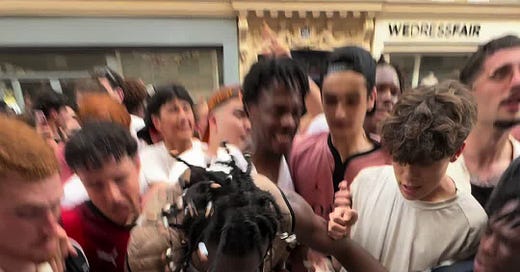This weekend, it felt like almost every young Black Londoner was in Paris. They had travelled by train, plane and even boat, for Fête de la Musique, an annual street festival that takes place across France on 21 June (it’s apparently celebrated internationally but the UK certainly doesn’t seem to observe it too passionately).
In France, the concept for Fête de la Musique — started in 1982 by the country’s then-socialist government — is simple: music, in the street, for free. There’s music in Nantes, in Lille, in tiny rural villages; from pounding techno to traditional folk sessions. And over the last few years, Fête de la Musique has slowly been getting the ‘hidden gem’ treatment outside of its home country, mostly via social media and the odd first-person experiential piece in the British tabloids.
This year, thanks to the 21 June falling on a Saturday and the added bonus of Beyoncé being in Paris at the same time with her Cowboy Carter tour, critical mass was reached; hundreds of Brits — most of them Londoners, most of them of Black heritage — shipped out to the French capital for the event. But what boggles my mind is how this entire phenomenon has gone pretty much undocumented by the press — bar the aftermath, which has seen a scare around ‘stinging’ (syringe attacks) emerge, reported on cluelessly by a media who doesn’t know how it began (more on that below).
Just going off my experience with travel and leisure trends, I think 2026 will prove even busier for Fête de la Musique — those who missed out this year, when it went from just bubbling under the radar to a full zeitgeist Place To Be, will not be keen to repeat the mistake. A lot of the conversation prior to the festival insisted that Fête de la Musique was “not carnival” (referring to London’s renowned Notting Hill Carnival) but just an ordinary “block party”. From where I’m sitting, it’s looking an awful lot as if it might evolve into something more Carnival-esque, even if it doesn’t maintain the same status long-term.
Bar the lack of masquerades and processions, FDM is a succession of street parties, with growing international interest and algorithmically driven appeal to young demographics with strong social ties and word-of-mouth recommendation cultures. What does that sound like?
Watch: next year not only will FDM be bigger, you’ll have British youth culture magazines like Dazed churning out quick ‘everything I experienced at France’s best music festival’ recaps, and some of the higher end publications that chase trend-led digital audiences (think British Vogue) sending photographers to do photo-essays too. Forget the socialist beginnings; brands will ramp up the international press trips and ‘activations’, rather than just the ones aimed at an internal French audience. For the last two years, it’s been impressed upon several of my British music industry acquaintances that it’s ‘important’ for them to be at FDM — a weathervane for the growing significance, and changing profile of the event in the global clout calendar.
Anyone even vaguely interested in how social media shapes culture should be tracking what is happening because what we are witnessing is an event being irrevocably changed — not for better, not for worse, just changed — in front of our eyes. And accompanying that are some fascinating tensions playing out in real time in the same digital spaces that are remodelling Fête de la Musique in the first place. Beyond the general contentifcation of events, here are three phenomena surrounding FDM 2025 that I’ve cherry picked as being of particular interest to me1.
1. Postfeminism disguised as diaspora wars
Preceding Fête de la Musique was the build up, realised through user-generated online content. At first, this was just the likes of ‘plan my outfit’ videos, posted by young women who dominate fashion and beauty spaces on platforms such as TikTok. But as such material proliferated, a trend became apparent: it was clear that 2025’s FDM was going to be patronised by a lot of Black Brits. A war of words brewed as the hashtag transcended borders: French girls started handing out ‘advice’, the bulk of which seemed to scorn the Brits for planning outfits with “heels” as if a “block party was Coachella”. The Brits started to say the quiet part out loud, retorting that the French women were “jealous” and that they were “coming to steal your men”. It went on like this, in videos, in comment sections, as people debated who was disrespecting who. I saw this particular bouef framed as a ‘diaspora’ war, between different Black groups. Technically this was accurate, because of the demographics involved. But I think this would have happened with any group of any ethnicity.
Keep reading with a 7-day free trial
Subscribe to The Chaff to keep reading this post and get 7 days of free access to the full post archives.




